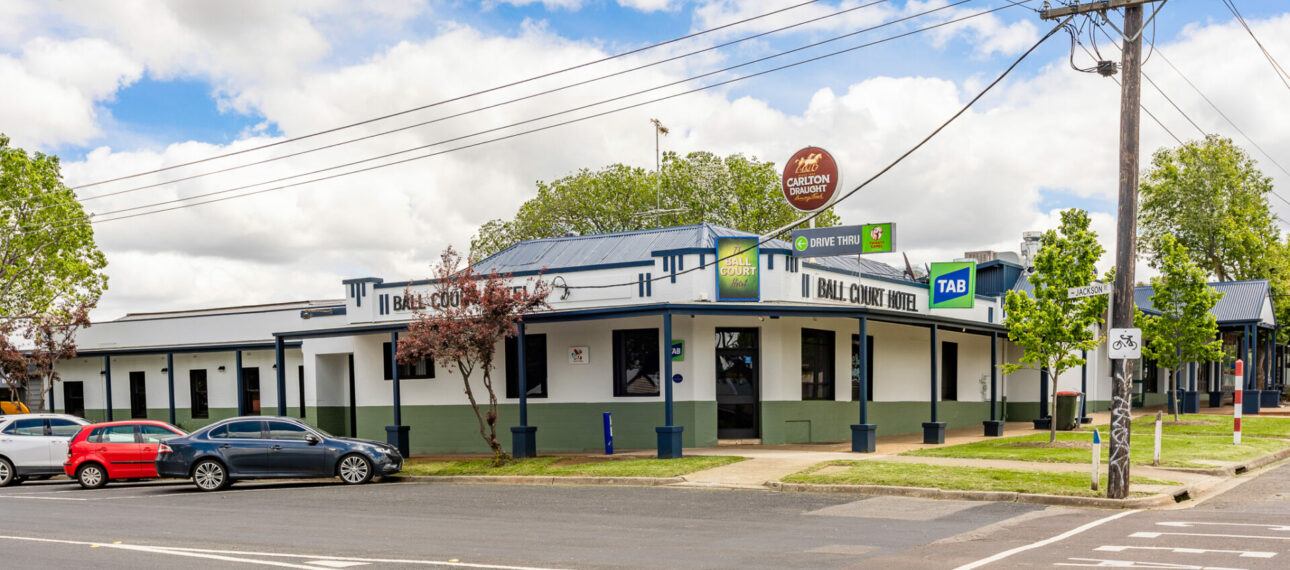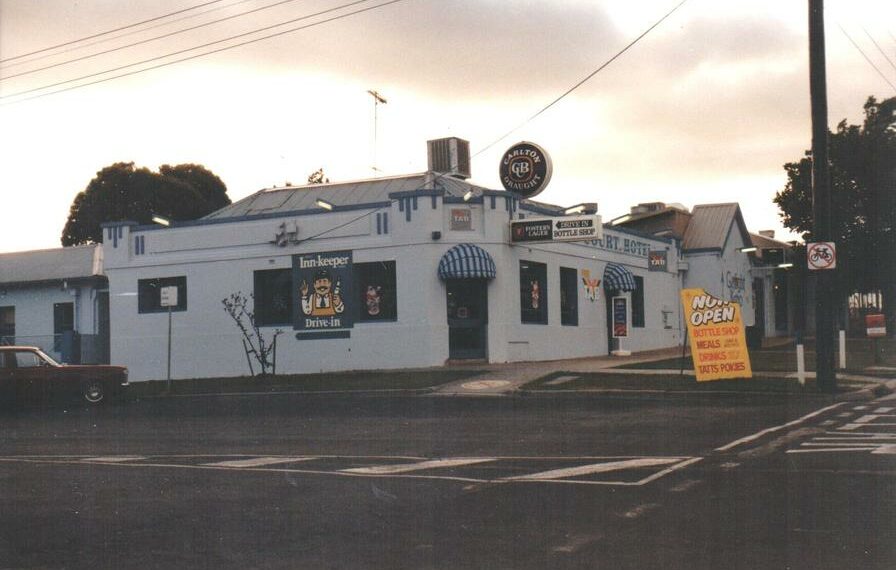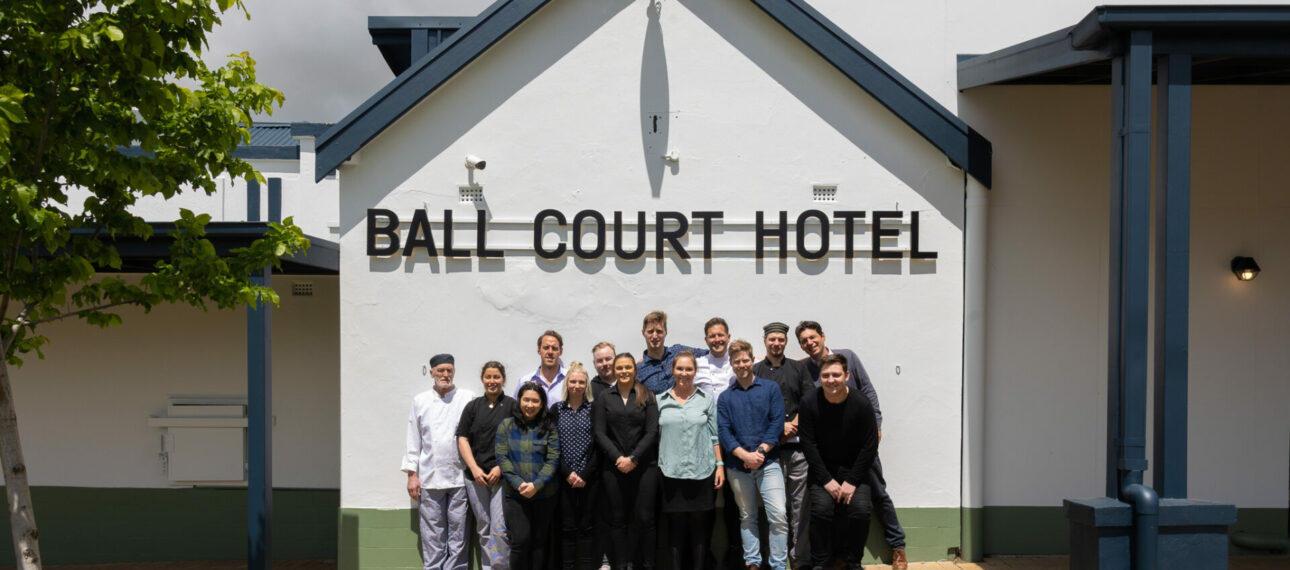The Ball Court Hotel, on the site of the Farmers Arms Hotel, was acquired in the mid-1870s by John Cahill, an Irishman and his wife Mary. While the original section of the Ball Court Hotel has undergone great structural change, the bones of the hotel remain today. It is the only remaining Nineteenth Century hotel in Sunbury and, like other hotels in country and coastal areas, it was the lifeblood of the town.
When John Cahill took over the Farmers Arms he introduced a version of Gaelic handball in a court, or “alley” behind the hotel. The sport was popular in Ireland and had been introduced around the world as Irish people left their homeland for new lives. As a result, John Cahill re-named his pub The Ball Court Hotel.
The town of Sunbury, 50 kilometres north west of Melbourne, has a fascinating history. In 1836 brothers Samuel and William Jackson arrived in the district and called the area Sunbury after Sunbury-on-Thames, Middlesex, England. The townsite was surveyed in 1851, the railway line arrived in 1859 and local government was granted in 1866. The area was something of a wine-producing centre with eight vineyards, including Goona Warra and Craiglee which have both been re-established in recent years.
In 1859 Sunbury celebrated a critical moment in its growth when rail reached the town. In 1874 the foundation stone at Rupertswood mansion was laid. Rupertswood is well-known as the birthplace of The Ashes after an urn containing the ashes of a burnt ball was presented to the England captain in 1882 after a social match at the estate. The term ‘Ashes’ was first used after England lost to Australia – for the first time on home soil – at The Oval on 29th August 1882. The next day a newspaper published a mock obituary of English cricket which concluded that: “The body will be cremated and the ashes taken to Australia”.
Possibly the most prominent licensee of The Ball Court Hotel of the time was John Cahill. The Cahills – John, his side Mary and seven children – were a notable and much-admired Sunbury family in the late 1800s who had emigrated from Ireland. John was active in the community, first as a bootmaker, then running the Ball Court Hotel and also, in the 1890s and several other business identities took out a gold mining lease near Sunbury.
In 1895 a notice appeared in the Sunbury News announcing a marriage of “the eldest daughter of Mr John Cahill of the Ball Court Hotel, Sunbury.” Annie was wed to Mr Hugh McGrath of Sunbury.
John Cahill’s name appears regularly in newspaper reports about The Ball Court and the wider Sunbury community. He was a local identity, involved with many of the activities in the town including local racing. He almost certainly sat on the committee of the Sunbury Racing Club. The Sunbury News carried a report in January 1902 about a meeting for the racing club at the Mechanics Hall. “John Cahill thoughtfully sent a small barrel of light refreshment for the workers”.
At another meeting in March that year the Sunbury News noted “John Cahill apologised for non-attendance but “sent word that he would have much pleasure in donating one pound to the club”. It was a very generous donation. Later that year, in November, the same newspaper reported: “A hearty vote of thanks was accorded to Mr M. Cahill for his services in connection with this event for some years past.” Either the paper got his first name wrong, or another member of the Cahill family was also involved. Either way it speaks of deep community involvement by the Cahill family.
It’s interesting how many newspaper reports mention the licensee of pubs in regional and country pubs (now on the edge of Melbourne, Sunbury would have certainly been considered country in the 1870s). It’s testament to their important role. Pubs were often the first structures built in newly settled towns, especially around and on the way to the goldfields.
In Australian towns the pub was always – and likely still is – the heartbeat of a town. In the 18th Century towns would often grow up around the pub, and the publicans would perform the critical role of feeding, watering and even hosting the marriages of the townsfolk. They would serve as sustenance for travellers, for informal socialising and more formal gatherings such as council and civic meetings.
The Ball Court was one of several hotels in the town of Sunbury. In 1911 The Sunbury News carried a long report about a licencing hearing for its pubs, and compared the pubs including the Court House, the Sir John Franklin for their various qualities. The report said: “Thought Ball Court did best bar trade of the four and Court House best trade for meals and beds.”
One pub’s internal accommodation was “not as good as Court House or Ball Court. This (Court House) and Ball Court had best buildings.” In the hearing it was reported that “Witness, in answer to counsel, said he always sent respectable people to the Ball Court for board or lodgings.”
John Cahill had become a prominent member of the Sunbury community, his Ball Court Hotel a landmark in the town. In January 1909 The Sunbury News published an announcement that John had died. The newspaper noted that the news “came as a painful shock to residents” as “one of the most popular men of the town” had died.
An obituary the newspaper published helps us understand more about the role the publication played in Sunbury in its early years. “Born at Thorles, County Tipperary, Ireland, in the year 1842, Mr John Cahill spent his childhood in that place and in the bloom of his youth he sailed for Australia in the good ship Royal Dann, landing in Melbourne, accompanied by his wife and child, in the year 1887.
“He settled in that city but soon tiring of that monotonous existence began casting around for a locality suitable to his ambitions and energetic nature. His choice fell on Sunbury”.
The obituary noted that John began work in Sunbury as a bootmaker, opening a shop in Vaughn Street. “But his energies not having sufficient scope in that direction he purchased the old Farmers Arms Hotel, adapting his time to maintain both businesses.”
The obituary noted that John was able to access sufficient capital to build “more commodious premises and 26 years ago he moved into his newly erected hotel, which was his home until the day of his death.”
The newspaper provided insight into why John Cahill was held in such high esteem in the Sunbury of the late 18th and early 19th Century. “The late John Cahill was a citizen of the town who held the unique position of being without a practical enemy, an honour conveyed to him by his quiet, unassuming demeanour and his charitable disposition. Being of a charitable disposition his purse was ever open to the needy.”
It showed us his nature as a father and husband. “In his home life the true nature of the deceased was evinced, as rearing a large family to manhood, and womanhood in a manner that clearly shows a kind, indulgent father, a loving and thoughtful husband and a strict disciplinarian, all of which are the true essentials of happy domesticities. The death of Mr Cahill has created a gap in the town of Sunbury that never can be filled.”
John’s widow Mary ran the Royal Mail after that, but sadly, five years later, in 1914, Mary, much beloved in the town, also died.
The Sunbury News ran an obituary for Mary too. It provided a rare insight into a significant and highly respected member of the Sunbury community, and echoed the important role Mrs Cahill played in the town alongside her husband John. It also provides a rare glimpse into the personality of a pioneering woman in the late 1800s.
“Another of the old pioneers of Sunbury died on Sunday June 28 in the person of Mrs Mary Cahill,” it said. “The deceased lady was a native of Thurles County, Tipperary, Ireland, where she spent her childhood.
“Then she was married and soon after sailed for Australia in the Royal Dann, landing in Melbourne in 1861 with her husband and child. After several months stay in the city Mr Cahill and his family came to Sunbury, and here Mrs Cahill spent the rest of her life rearing a large family and gaining the goodwill and respect of everyone with whom she came in contact.
“Then later Mr Cahill purchased and conducted the old Farmers Arms Hotel which was situated nearly opposite to the Sir John Franklin Hotel. Then some 30 years ago he built the present Ball Court Hotel which has been the home of the Cahill family ever since and has been ably conducted by the late Mrs Cahill since her husband’s death in January. The late Mrs Cahill had 10 children, seven of whom are still living.
“Mrs Cahill by her quiet unassuming demeanor and charitable and kindly disposition made a large circle of friends who were grieved.”
A notice appeared soon afterwards in The Sunbury News about instructions from the executors of the late Mrs Mary Cahill to “sell by auction the Ball Court Hotel, Macedon Street, Sunbury, on Monday October 5 at 2pm.”
In 1914 The Sunbury News ran a notice that instructions had been received from the executors of the late Mrs Cahill to “sell by auction the Ball Court Hotel… on Monday 5th October at 2pm.”
Sport was a popular pastime in Sunbury at the turn of the 18th Century. The local football side’s fortunes were enthusiastically covered in the local paper. Reported The Sunbury News in July 1896 that the SFC (Sunbury Football Club) took on “the Kyneton club.. and the SFC took 30 players to the scene of the battle. The game was fast from the bounce and the home team drew blood almost before the players had got fairly started by Heffernan kicking a goal from the angle…. “Though the ball as greasy and the ground soft some good play was put in by both teams.
Again, John Cahill was involved, with The Sunbury News noting in July 1896 that a meeting of the committee of the Sunbury Football Club would be held at The Commercial Hotel. “Mr Cahill of the Ball Court Hotel and an enthusiastic supporter of the S.F.C. promised the members a dinner if they ‘beat Kyneton’ last Saturday.” Unfortunately they didn’t win but “they went so near (to) accomplishing this feat that he gas intimated his intention of donating 10 shillings to the club.”
Horse racing was also popular in Sunbury. In 1924, another Cahill was making the news. This time it was Claude Cahill, a horse trainer, son of Mr M.J. Cahill, formerly of Sunbury, and, as The Sunbury News reported that the Melbourne ‘Sporting Globe’ had written about “a former Sunbury boy”. That boy, the paper said, was “a grandson of the late Mr John Cahill, who built the Ball Court Hotel, Sunbury and who was for years the proprietor of that well-known hotel.”.
The newspaper spoke of Claude Cahill’s success as a trainer. “Claude Cahill recently has had a successful time with his small team. He won a race last week at Nar Nar Goon which was heavily backed. Young Cahill has displayed his ability by winning many races with the horses and ponies that have been through his hands… Cahill thoroughly understands his business. He intends applying to the VRC Committee for a trainer’s licence and he already has the promise of some useful horses if his application is successful.”
It wasn’t just racing horses that received coverage. In September 1908 The Riverine Herald carried the news that “a valuable draught horse, valued at 50 pounds, the property of Mr John Cahill, proprietor of the Ball Court Hotel, Sunbury, has died, and a veterinary examination disclosed that fact that death was due to influenza. This is the first case known in the district.”
The many stories we read in newspapers of the time show how deeply The Ball Court Hotel was engaged in its community, and how important the hotel and its proprietors were to the functioning and happiness of the town.



